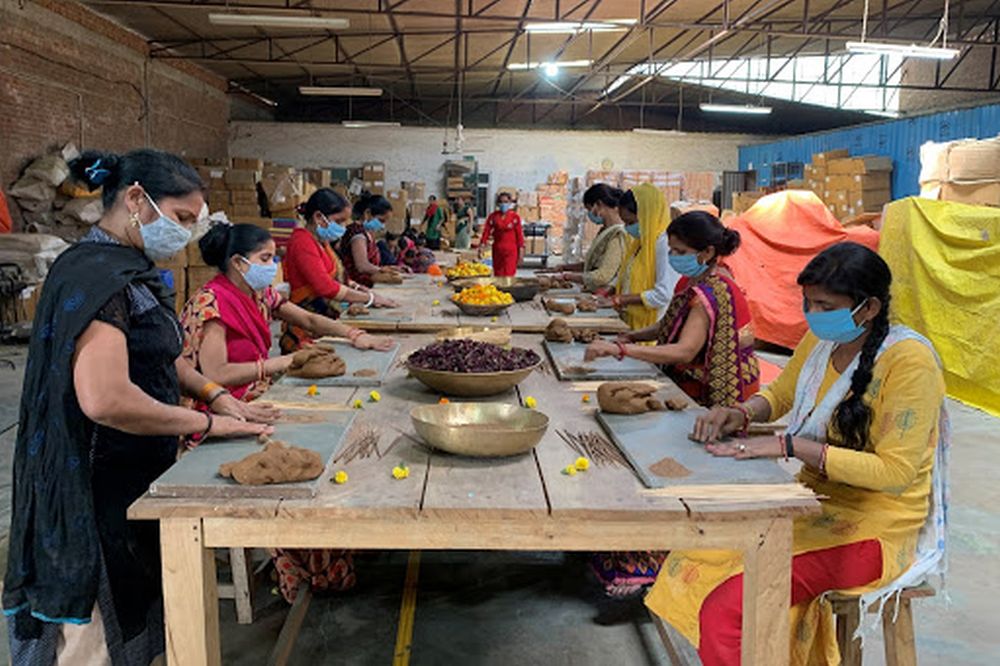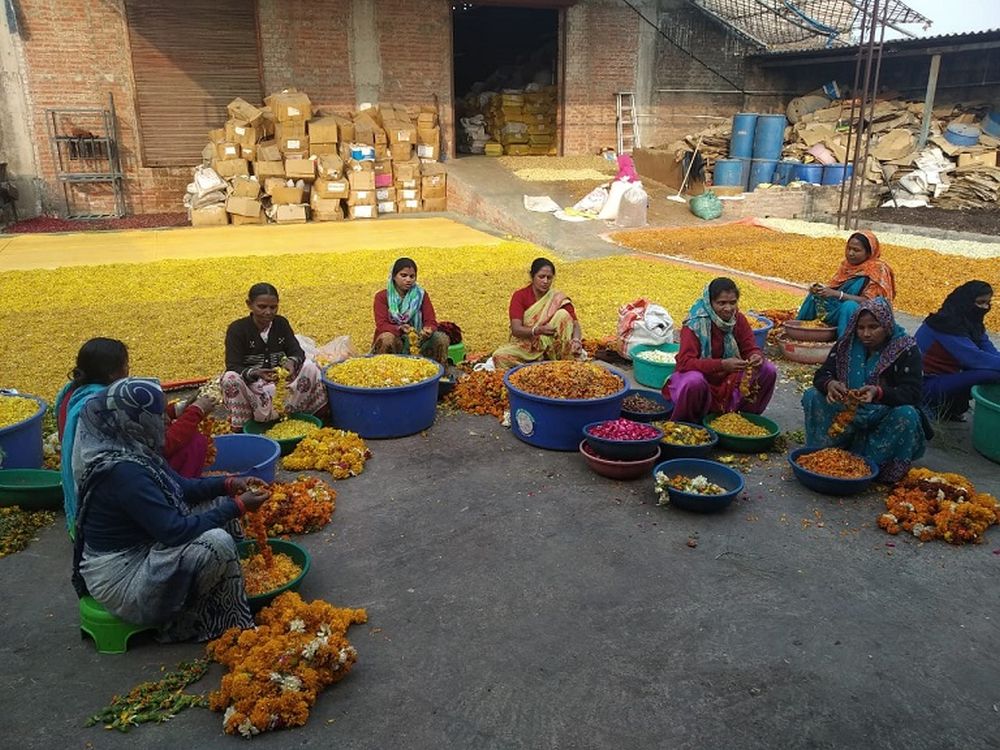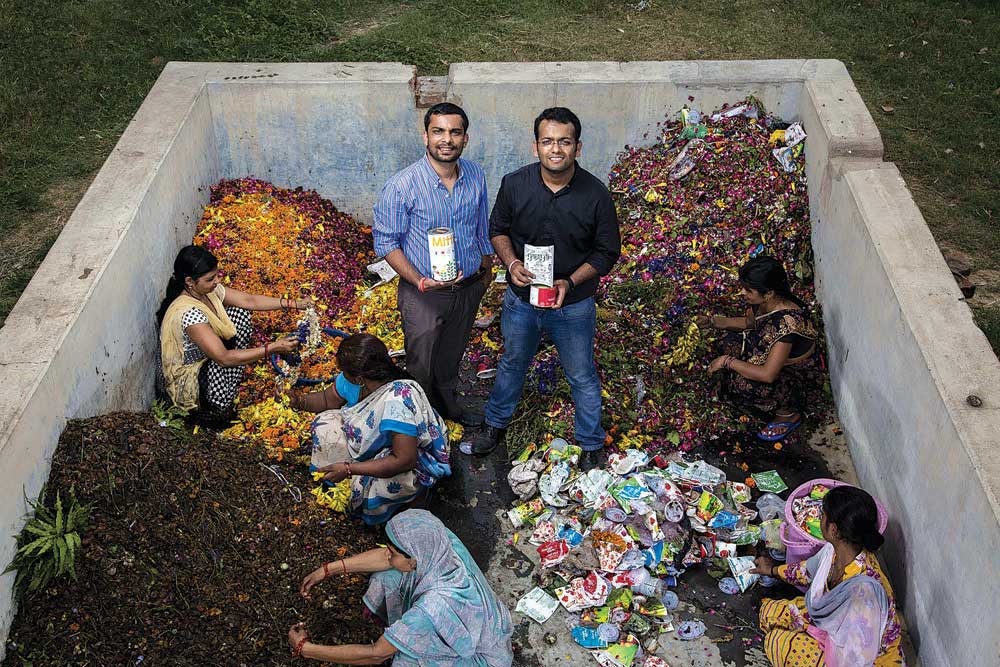Indian Entrepreneur Helps Recycle Floral Waste Dumped into the Ganga River
Sitting across the wooden tables, women with face masks roll the brown dough into a thin cylinder – recycling millions of tonnes of flowers that Hindu devotees throw in Ganga. They are a part of the effort by entrepreneur Ankit Agarwal’s start-up ‘Phool,’ transforming floral waste from the Ganga into incense sticks. With a team of 100 working people, Phool (meaning flower) is helping to remove floral waste from the most polluted holy river of India in the northern state of Kanpur.

Workers make incense sticks after kneading powder made from discarded flowers collected from outside the temples, near the Ganga river | Image: Reuters
India has a very particular problem with river pollution, especially holy rivers like Ganga and Yamuna. As a part of religious customs, tonnes of flowers are collected in the temple every day. But what happens after that? Agarwal says that nearly eight million tonnes of the offering end up in the stretches of Ganga each year, through sewage and domestic waste as well.
Many mass grown roses, marigolds and other flowers are covered with pesticides, making them toxic for the river. Pollutants like toxic-arsenic, lead and cadmium contaminate the water bodies, turning them into deadly carcinogenic soup. Despite being natural and biodegradable, the decaying flowers release nutrients which can be a problem. The Algae can grow rapidly, reducing the oxygen level in the water, and also affect the marine life in the river.
For rivers like Ganga, which is a primary water source to 400 million people, this toxicity can become deadly for people. The dissolved chemicals change the pH level of water, which can cause diseases like diarrhoea. These illnesses are responsible for 87.6% of child mortality.
Watching worshippers collect the holy water, Agarwal says that these worshippers unknowingly turned against the river which is dear to them. He decided that there must be a better way to use these flowers, and partnered with his friend, Karan Rastogi, to repurpose and create something new from these discarded sacred offerings.
Even though their idea was fantastic, they had to go through obstacles in the early days. It took them almost a year and a half to make a pitch and continue research and design the process to find a solution to manage this unique and distinguished waste.
According to Ankit Aggarwal;
We had to toil to convey our idea of recycling the temple waste because nobody was willing to take it seriously or give up their floral waste.
His team mainly comprises women from disadvantaged backgrounds that the company is working to empower through employment. The women were initially jobless or manual scavengers, but now they have a job that demands respect and recognition, cleaning the holy river Ganga.
These women pluck out the discarded flowers and gather them from the temple. Then they are detoxified with a special spray that contains chemicals to neutralise and break the toxins from insecticides and pesticides. A purple residue is formed in the process, which can be washed away easily. The petals are then separated and left to dry – eventually repurposing the flowers into things like incense, paper, or as watercolours for the Hindu festival of Holi.
To discourage buyers from discarding the package, it stamped without the images of Hindu gods and the paper is infused with basil seeds, which are considered holy in Hinduism. The concept behind it is that the packaging can be sown, and the Tulsi plant grows out of it.
Also Read: Discarded Fishing Nets Threaten Wildlife in River Ganges
Phool has already made several products already- incense being the first of them, and intended for use in the same temples from which they collect the discarded flowers. The packaging is also quite difficult to throw away as the packaging paper is coated with basil seeds.

Women segregating the washed petals from garlands and letting them dry under the sun | Image: Business Insider
Surprisingly, Phool stumbled upon innovations to solve much more prominent sustainability issues. After storing the unused flowers for incense stick, they found a dense matt fibre growing that had properties of leather. They started to investigate more and created Feather, a vegan leather that is a great alternative that is sustainable and 100% biodegradable at the end of its lifecycle.
With an intent to solve the bigger sustainability problems, Phool received investment from the social segment of the Tata Business Group.

Ankit Agarwal and Karan Rastogi – founders of Phool, trademarking the term ‘flower cycle’ | Images: Open Magazine
With great intent comes bigger obstacles and problems. The innovative venture has proved that with a strong determination to solve the bigger societal problems, success isn’t too far, no matter what the obstacles in the quest are!
Source: World Economic Forum


